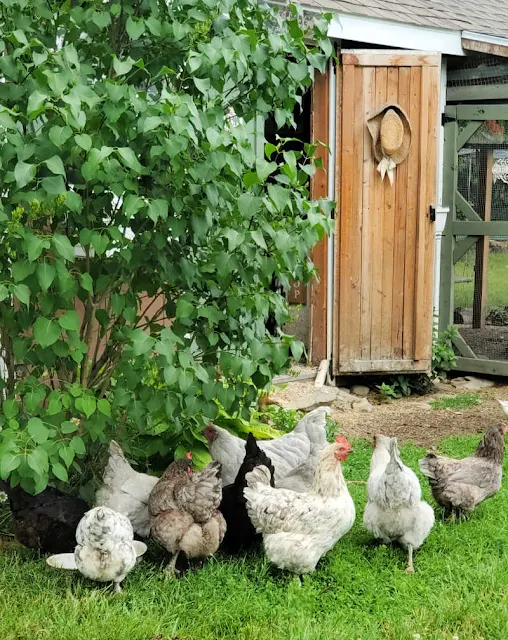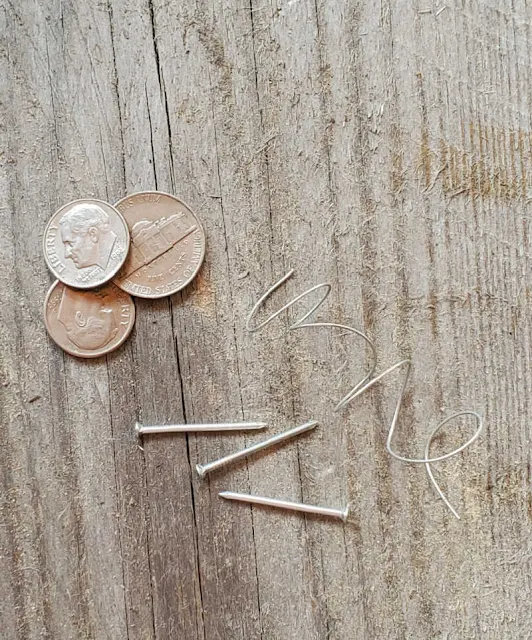Preventing Hardware Disease (Heavy Metal Poisoning) in Backyard Chickens and Ducks
Chickens, ducks and geese are attracted to shiny things they find on the ground like spare change, nails, screws, hooks, aluminum foil, earrings, bits of wire, pieces of glass, staples and the like.
This is extremely dangerous and can lead to serious health problems and even death as the heavy metals break down, enter the blood stream and slowly poison the bird - or sharp edges perforate the intestine, leading to infection.
This is referred to as "hardware disease", although it isn't technically a disease at all. But regardless, it's a dangerous condition that can take days or weeks for symptoms to emerge, and by that time it's generally too late because it's very difficult to treat (but fortunately pretty preventable).
Preventing Hardware Disease (Heavy Metal Poisoning) in Backyard Chickens and Ducks
It's not just free range flocks that are in danger of ingesting dangerous materials. There can be loose pieces of metals or other harmful scraps in the dirt in your chicken run leftover from when your coop and run were constructed, or even from previous owners.
The photo above contains the actual things that I have found unearthed in and around our chicken coop and run just in the last few weeks. I check our run and the entire area around the barn where our chickens and ducks often free range religiously for sharp things and foreign objects, but they seem to dig things up faster than I can remove them.
Construction materials and supplies left over and buried in the dirt from previous owners always seem to be resurfacing, despite my best efforts. I think the chickens scratch up the objects and then the ducks risk ingesting them.
I am lumping pieces of glass into this article, even though its not technically considered a cause of 'hardware disease', glass can cause internal lacerations and injury from being swallowed accidentally.
Ducks and Hardware Disease
Ducks are even more susceptible to Hardware Disease than chickens because they are forever rummaging around in the dirt and seem love to eat shiny things they discover. They can easily suffer copper, zinc or lead poisoning, lacerations or worse if they ingest things like spare change, pieces of metal, wire or glass.
In fact, Heavy Metal Disease is the number one killer of pet ducks, but chickens can sometimes swallow things they shouldn't as well. So do your flock and yourself a favor and 'sweep' their area regularly.
If you DO suspect your duck or chicken has swallowed something, get her to a vet ASAP for x-rays, a blood test and check for internal lacerations.
Symptoms of Hardware Disease
Early symptoms of hardware disease include a decreased appetite and spending time alone. More advanced symptoms may include:
- Loss of appetite (although possibly increased fluid intake)
- Dehydration
- Vomiting
- Weight loss
- Weakness and lethargy
- Watery bright greenish or bloody droppings
- Drooping wings
- Unsteadiness, difficulty walking
- Loss of vision
- Seizures
- Death
If a chicken or duck displays any of these symptoms or you even suspect they have swallowed something toxic, get them to the vet immediately for an x-ray and blood test to check for traces of metal.
As with many things, prevention is far easier than trying to treat this affliction, so it's important to be aware of these simple ways to prevent ingestion of foreign objects.
Preventing Hardware Disease
- Avoid using galvanized metal feeders, waterers and fencing.
- Don't use glass in or around the run or coop.
- Make weekly inspections of your run, pen, coop area and any free range area for small metal objects.
- Sweep the area with a metal detector after construction or building projects have been completed.
- Be mindful of wearing earrings, necklaces or other jewelry that could fall off, become entangled and break, or get lost in the area.
- Don't use weed whackers, lawn mowers, chainsaws or other types of equipment near your coop area. They can send small metal pieces flying everywhere.
- Check bales of hay, straw and shavings for debris before using them as bedding.
- Have your soil and water tested for heavy metals and take steps to treat any excess or limit your flock's exposure to the contaminated soil or water - i.e. locate coop in a different area or use filtered or bottled water.
Potential Sources of Lead Toxins
- Fishing weights, sinkers and lures
- Lead gunshot
- Lead-based paint and paint chips (especially in older structures)
- Christmas ornaments
- Toys and toy parts imported from China
- Coins
- Costume jewelry
- Batteries
- Water
Potential sources of Zinc Toxins (also known as New Wire Disease)
- Galvanized aviary wire (the more shiny the wire, the higher the zinc content)
- Galvanized nails
- Galvanized metal feeders and waterers
- Coins
- Staples
- Fertilizers, soil
- Some paints
Potential sources of Iron Toxins
- Nails
- Water (or water pipes)
- Soil
- Scrap metal
- Machine parts
- Insecticides
- Multi-vitamins with iron (especially a concern if you have house chickens or ducks)
Treatments for Hardware Disease
Zinc poisoning is different from lead poisoning in that zinc is able to work its way out of your bird’s system provided the source of contamination is successfully and completely removed.
So offering plenty of fluids and some molasses helps flush the toxins and cleanse the blood, although won't help her pass glass, coins, screws or other hardware which sometimes will pass naturally or otherwise require surgery.
(Galvanized wire fencing that is sunk into the ground can leach zinc into the soil, so be aware that treatment might also require removing the offending fencing. A safer option is coated wire.)
Regardless of the cause of the toxic reaction, fluids can be beneficial, as can separating the ailing bird and setting her in a quiet, calm location to allow her to recover.
- Plenty of clean, fresh water
- Molasses or Nutri-drench
- Keep calm and possibly separated
Herbal Treatment for Hardware Disease
The following herbs in particular may be helpful:
- bay
- borage
- cilantro
- dill
- lovage
- marigold
- mint
- plantain
- rose petals
- sage
- tarragon
- thyme
Other Natural Treatments for Hardware Disease
What you Do | Crush the tablet and stir it into the capsule powders. Mix in a small amount of water to get the consistency of pulpy orange juice.
Feed 2-3 cc's orally twice a day using a plastic syringe or eyedropper. This should help break down any fibers impacted with the metal and move any blockage as well as remove the toxic material, and provide some immune system support.
Treatment for Hardware Disease by an Avian Vet
Hardware disease is extremely serious, needs to be treated quickly and shouldn't be taken lightly.
Despite offering some at-home and natural remedies, if possible, I highly recommend a visit to the vet if you suspect any type of poisoning.
Treatment by your vet may include:
- A chelating agent which works by binding with and filtering the heavy metal out of the body.
- Vitamin B complex (thiamine in particular) to prevent further poisoning and allow the body tissues to recover.
- Anti-convulsants to prevent seizures.
- Bulking agents can be fed to assist in removing small particles from the intestine.
- Surgery under anesthesia to remove large piece of metal.
- Antibiotics to prevent infection while the body is recovering.
- Euthanasia, if surgery isn't an option.
But again, an ounce of prevention IS worth a pound of cure, so be super vigilant about keeping your chicken and duck area free of metal debris and you shouldn't have any troubles.


































